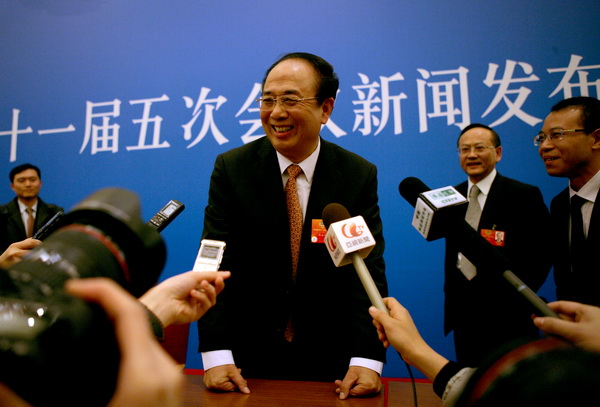Firms learning to go global
Updated: 2012-03-03 09:16
(China Daily)
|
|||||||||||
'Public diplomacy' seen as helpful for smooth business transactions
 |
"A majority of Chinese companies are still at an early stage on the road," said Zhao Qizheng, spokesman for the annual session of the National Committee of the Chinese People's Political Consultative Conference (CPPCC).
"They lack in-depth and comprehensive knowledge about overseas markets, practices and rules, and they are not adept at conducting public diplomacy with the local communities," he told reporters at a news conference held in Beijing.
 |
|
Zhao Qizheng, spokesman for the annual session of the National Committee of the Chinese People's Political Consultative Conference, gives an interview after a news conference in Beijing on March 2, 2011.?[Photo/China Daily] |
Zhao has been an advocate of public diplomacy - communication with the public of other nations to establish a dialogue designed to inform and influence.
"We have seen some nice examples by Chinese companies on investing overseas, such as by Sany," Zhao said.
The Hunan-based machinery equipment provider recently announced it would pay 324 million euros ($428 million) to buy 90 percent of Germany's largest concrete-pump maker Putzmeister Holding, said Zhao.
He made the remarks ahead of the fifth annual session of the 11th National Committee of the CPPCC, scheduled to open on Mar 3 afternoon in the capital. The session will last 10 days.
By noon on Friday, 1,501 of 2,262 members of the CPPCC National Committee had registered at the session, and the secretariat had received 792 proposals and 429 speeches, Zhao told reporters.
The proposals include developing the real economy, promoting small and medium-sized enterprises, boosting domestic demand, and improving the environment and air quality, said Liu Xiaobing, deputy director of the proposal team of the fifth session of the 11th CPPCC National Committee.
In its 12th Five-Year Plan (2011-15), China is encouraging qualified and capable Chinese companies to invest overseas.
In 2011, China's outbound direct investment in the non-financial sector surged by 1.8 percent from a year earlier to $60.1 billion, according to the Ministry of Commerce.
In January, the nation's outbound direct investment grew by as much as 60 percent year-on-year to $4.4 billion.
But Chinese companies have been continuously challenged with how to buy abroad, and an unfavorable political environment in foreign nations has made it difficult in many cases for Chinese companies to win bids.
In 2005, the China National Offshore Oil Corporation withdrew its $18.4-billion bid for Unocal Corp due to strong opposition from the US government.
The failure of the case could be attributed to the lack of efficient public diplomacy, which made it impossible for the Chinese government and companies to counter the voices of opposition, said Zhao.
Nuclear cooperation
China is willing to enhance cooperation and exchanges with Japan on nuclear power and other new resources to learn from each other and improve capabilities for new resource development for both nations, said Zhao.
He also noted that China will develop its nuclear power policy under "extremely safe" preconditions, considering the huge losses incurred from the Fukushima nuclear plant accident in Japan last year, and will focus on design and construction of the third-generation nuclear power stations.
"China is enhancing efforts on drafting nuclear safety guidelines and mid- and long-term development plans for nuclear power," Zhao said.
Related Stories
Sany purchased German company 2012-02-05 17:59
Companies prepare to expand business 2012-02-17 15:14
Overseas Chinese talents find home with domestic companies 2011-06-20 10:58
Difficult year ahead for export companies 2011-12-08 08:00
- China reduces holdings of US govt bonds
- Chinese firms learning to go global
- China to change foreign trade growth pattern
- Riches from Russia with love
- Milk price hikes leave many feeling sour
- Auction to boost China's shale gas exploration
- Property sales rebound in February
- CSRC calls for 'rational investment'








